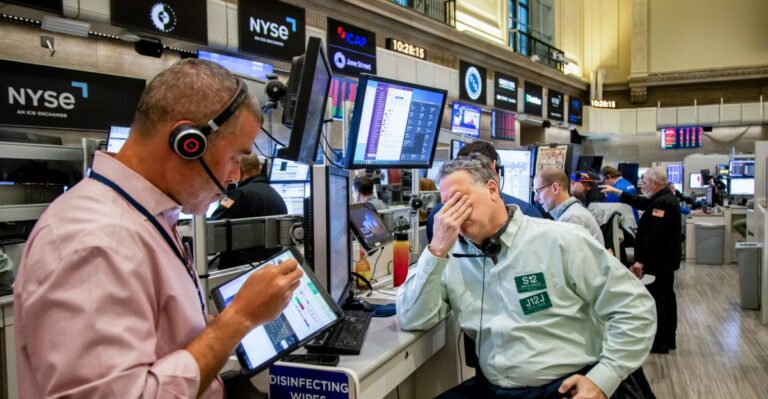The US stock market has lost trillions of dollars in value in the days since President Donald Trump announced major tariffs on American imports.
That’s been a big blow to the finances of the many Americans who own stock — and an even bigger blow to those close to retirement.
As of Tuesday afternoon, the S&P 500 was down more than 11 percent since Trump’s announcement of the tariffs. Global stock indices, such as the Japanese Nikkei and the German DAX, have also plunged as the tariffs disrupt world trade.
Stocks recovered somewhat after Trump indicated that he’s in negotiations — including with countries such as Japan and South Korea — to broker what his press secretary Karoline Leavitt called “tailor-made” trade deals.
But the question is how quickly those deals can get done without wreaking further havoc on financial markets.
Because in Trump’s burgeoning trade war, Americans with money in the stock market are proving the earliest collateral damage. And that isn’t just the wealthy; they are some of the same people who had already been feeling the pinch of higher prices post-pandemic.
Who invests in the stock market?
A majority of Americans — 62 percent, according to Gallup — own stock in some form or another, whether as individual stocks or by investing in their 401(k)s, IRAs, mutual funds, and pensions.
More Americans are invested in the stock market than at any point since 2007, on the eve of the Great Recession. That’s in part because it’s become easier than ever to buy stock with the introduction of investment vehicles like exchange-traded funds and online platforms like Robinhood.
It’s also a result of necessity: Amid concerns about the future of Social Security benefits and as most companies have abandoned pensions, some 70 million Americans now have a 401(k).

The wealthy invest in stocks at a disproportionate rate, with the richest 10 percent holding 93 percent of all US stock as of 2023.
But large shares of middle and lower-income Americans also own stock and are counting on their returns to fund their retirement. Even members of the United Automobile Workers, some of the biggest proponents of Trump’s tariffs, have money in the stock market via their union-guaranteed pensions.
Those close to retirement or already retired may not have time to ride out a stock market dip and are seeing their accounts shrink, forcing them to cut back.
In that sense, the market volatility stemming from Trump’s tariffs is not just a problem for Wall Street elites.

In many ways, regular Americans are poised to be hurt the most by the economic fallout from the Trump tariffs, which have caused US economists to significantly raise their recession odds. Not only may they see their net worth decline as the stock market reacts, but they may also expect higher prices and a tougher labor market.
As companies face higher costs due to the tariffs, they are expected to pass that on to the consumer in the form of higher prices. Economists project that the tariffs will lead to a $3,789 decline in disposable income for the average US household.
US companies may also be forced to cut costs by shrinking their labor force, potentially leading to an increase in unemployment.
All of this suggests that Trump’s tariffs may have the opposite of what Trump says is their intended effect: to “Make America Wealthy Again.”


